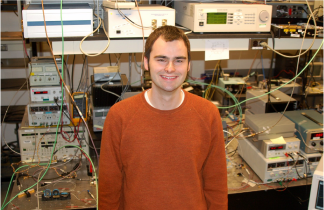
(From Left: Laura Kolton (OSA Public Policy Team), Greg Quarles (President of B.E. Meyers Electro Optics), James van Howe (Assistant Professor, Augustana College), Representative Bobby Schilling (IL), Adam Zysk (research associate IIT, Chicago), Hong-Jhang Syu (Research Assistant, National Taiwan University))
On Thursday May 5th, a number of the conference attendees took a bus to Washington D.C. to visit the offices of various members of congress and senators of our respective legislative districts and states. Our goal was to help defend science funding levels in the wake of strong national sentiment to reduce U.S. federal spending.
What we learned the night before in the briefing at the Baltimore Convention Center was fascinating, and the actual day of visiting policy-makers to discuss science-funding issues was exhilarating. In the briefing, we learned that one of most effective ways of influencing a senator or member of congress was through a conversation with a constituent. Visits from lobbyists actually rank much lower on survey data from congressional staffers. What was also fascinating to me was that an email from a constituent ranked just below a visit from a constituent and still far above a visit from a lobbyist. I immediately promised myself to regularly send email to my representatives and you should too! It works!
At the briefing, one of the speakers, Mike Lubell, the Public Affairs Director at the American Physical Society, showed us revealing survey data from focus groups. One group was from a community with many ties to science industry and one had very little. Shockingly, the results were the roughly the same for each:
1. The groups generally loved science and are supportive of science research
2. The groups thought that science should be a national priority
3. Here's the kicker: The the groups were distrusting of the federal government as the funding source for science research. Somehow they want to keep good science without federal funding.
So there is good and bad news. Scientist can expect good moral and emotional support from the public, but maybe not dollars. In fact, Lubell showed a list that had science as the second most chosen category from the groups of where to cut federal funding.
Our task for the Capitol Hill visits was well laid out- try to educate our representatives about the role of federal money in science research; how it is almost the sole source for science funding in the U.S., how science requires sustained funding over time for results, and how our quality of life is enhanced by the technology we develop such as noninvasive biomedical imaging techniques for cancer diagnostics and photovoltaics for green energy production, not to mention the highly skilled workforce good science creates.
I particularly liked Lubell's list of "good" and "bad" words and phrases to bring up or avoid as you are trying to convince non-scientists of the importance of federal funding for science. Words like "basic research" and "fundamental research" did note bode well in the public eye. They took "basic" and "fundamental" to mean "remedial." The phrase, "Investing in America's future," tracks well with Democrats, but not Republicans since "investment" to the GOP means "spending." There was a fairly strong equal distaste among different parties for the idea that America needs to be the top competitor among foreign nations in science. I guess our Cold War attitude as been slipping since Reagan administration. A "good" party-neutral phrase is the cheesy (sorry but it is), "Building a better America." The list goes on and is both entertaining and illuminating as to the perception of science in the U.S.
Because I live in Iowa but work in Illinois, I met a handful of staffers from both states. From the picture above, you can see that my team was able to personally meet congressman Bobby Schilling (R) from Illinois. Congressman Schilling was extremely kind and hospitable, as were the staffers from the other offices we visited: Senator Kirk (R-IL), Senator Grassley (R-IA), Congressman Quigley (D-IL), and Congressman Braley (D-IA). I was very impressed with the professionalism and cordiality of the young staffers who took the time to listen to our concerns.
So I know you are now asking yourself, "What can I do to help?" Begin by emailing your representatives with your concerns for science funding (at the Capitol Hill visits we were advocating sustained levels (not an increase) . Also be sure to visit the OSA public policy homepage for updates on additional organized Capitol Hill visits, pending science-bearing legislation, letters to sign, etc.
For more info and photos on the Capitol Hill day event click here.

No comments:
Post a Comment